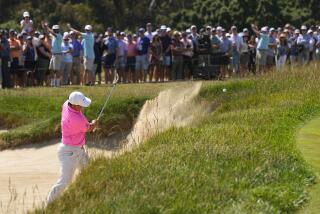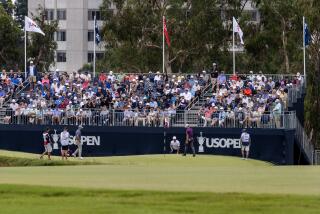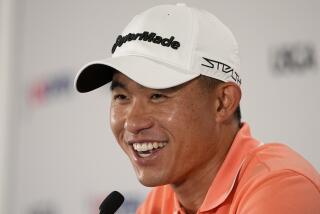This Puts the Cart Before the Course
- Share via
If Casey Martin’s hearing were held in the court of public opinion he’d likely be riding in pro golf tournaments as long as he wanted.
For Arnold Palmer and Ken Venturi, who have been around golf for more than 100 years between them, it is a much more complicated issue.
Martin’s Nike Tour victory last week was one that further strengthened overwhelming sentiment among nongolfers that the PGA Tour is wrong with its ban on riding carts.
Among golfers, casual recreational players seem to be siding with Martin to some degree while those with a first-hand understanding of the fatigue factor in the game are more understanding of the ban on carts.
“I think the greatest thing I ever saw in golf was Ben Hogan limping up and winning the Open,” Venturi said, referring to Hogan’s victory in the 1950 U.S. Open just 16 months after his legs were shattered in an auto accident.
“I think fatigue and being in shape is really part of the game,” Venturi said from his office in Florida. “It’s been that way since the beginning of the game. My feeling is no carts.”
If carts had been an option at the 1964 U.S. Open at Congressional Country Club near Washington, another of the most memorable moments in golf would not have happened.
With temperatures climbing past 100 degrees and the Potomac River Valley wrapped in a suffocating blanket of humidity, Venturi staggered through the 36-hole final day, nearly collapsing from heat exhaustion, but hung on for a victory to rival Hogan’s.
Part of being an athlete--and golf is an athletic event--is experiencing and handling the varied emotional and physical demands of the sport.
Palmer, who gave a deposition on Monday in the Martin case, said he opposes carts, even on the senior tour where they are now allowed.
“I think part of the game, and the tradition and integrity of the game, is being able to walk and compete,” Palmer said Tuesday.
“If I’m too old to walk, which is getting close, then I will quit,” Palmer, 68, said. “I feel very strongly about that. . . . Life is that way and it can’t all be beautiful. I’m opposed to carts in competition.”
While Martin was magnificent in his victory, one thing was clear: Without a cart he wouldn’t have won.
“I have to admit I am fatigued,” Martin said Sunday night on “Viewer’s Forum” on The Golf Channel.
This could very well be a point that Martin’s lawyers will argue in federal court Feb. 2 in Eugene, Ore. One reason not to give a cart to Martin is that he would have an unfair advantage over the players who walk.
But if Martin rides and is still as tired--or more tired--than those who walked, he didn’t gain an advantage but merely was afforded an opportunity.
“It has been a long week,” Martin said. “And yeah, even though I have a cart I am worn out. So the fatigue factor plays into my game as well.”
There is a problem with the argument that Martin was just as tired as everyone else--it applies only to Martin. What about other cases that might come up?
“This is not a black and white issue, a heads or tails issue that is just about Casey Martin,” Venturi, a golf commentator for CBS, said. “Where do you draw the line? How disabled do you have to be? What about guys like Billy Glasson and Scott Verplank who have had so many injuries and would be helped by a cart?”
The chance that a compromise between Martin and the PGA Tour will be reached is just about zero. There really is no room to compromise. Martin needs to ride to be able to compete.
The PGA Tour says walking is essential to competitive golf. And it argues further that the PGA Tour--and not the courts--has the power to determine the rules of competition.
Besides, what would a compromise be? To make a rule applying to just one player? That seems unlikely--and dangerous. Anyone at any time could try to use a Martin compromise as a precedent.
Martin has displayed enormous emotional and physical strength the last few weeks and exhibited a wide array of shot-making skills. He has handled his sudden attention from the fans and media with grace, composure and insight.
Absolutely no one has a bad word to say about Casey Martin.
Unfortunately, this case is not just about Casey Martin.
More to Read
Go beyond the scoreboard
Get the latest on L.A.'s teams in the daily Sports Report newsletter.
You may occasionally receive promotional content from the Los Angeles Times.










